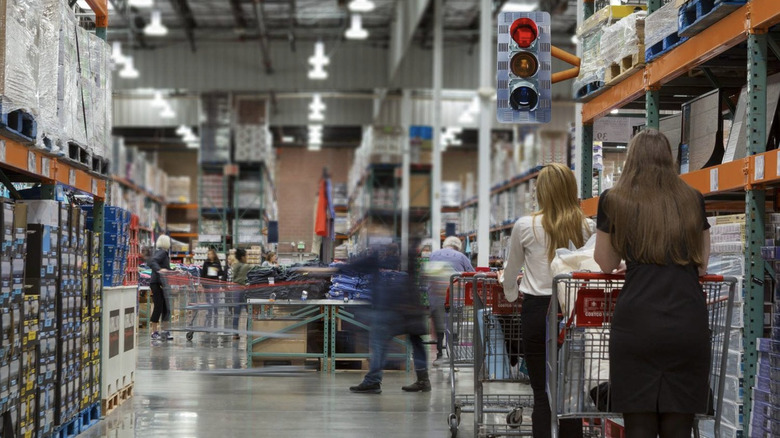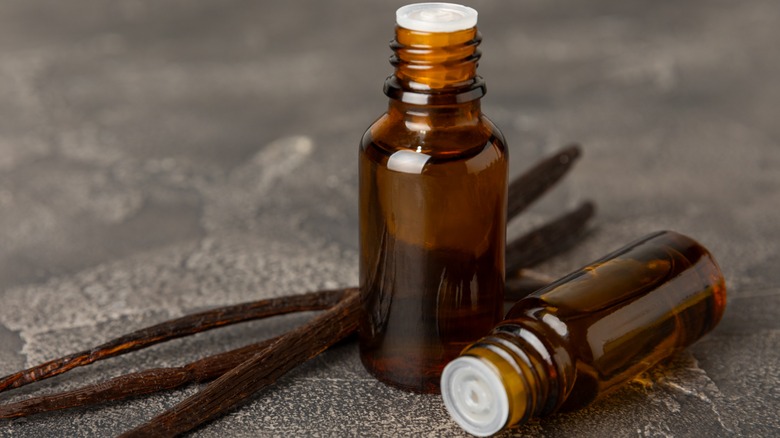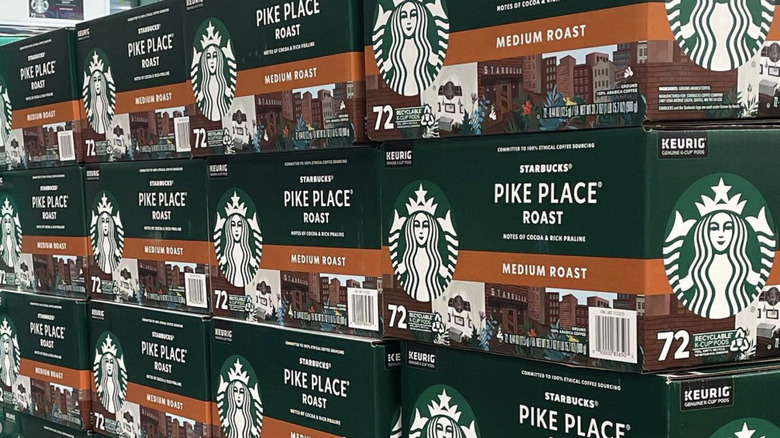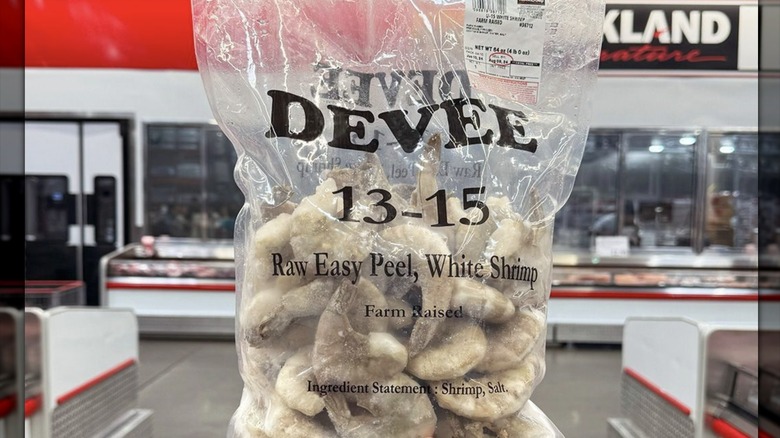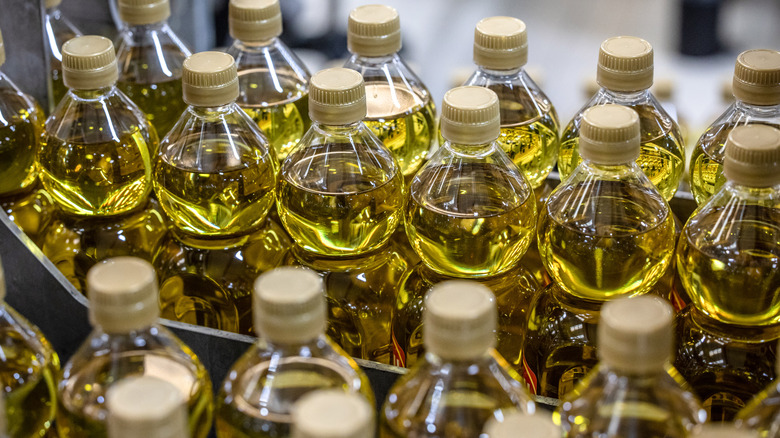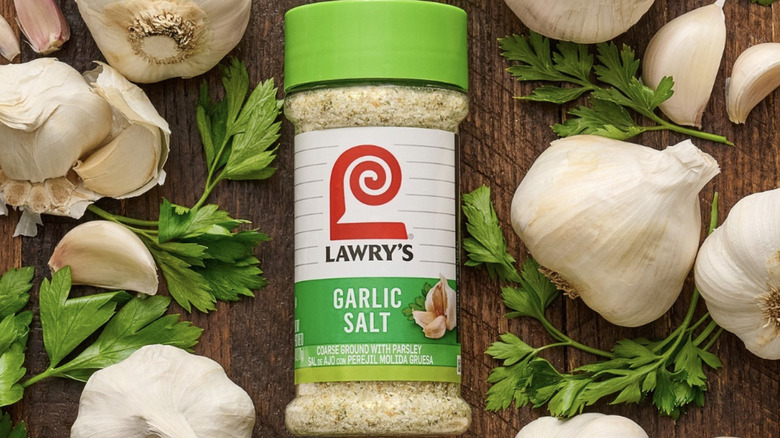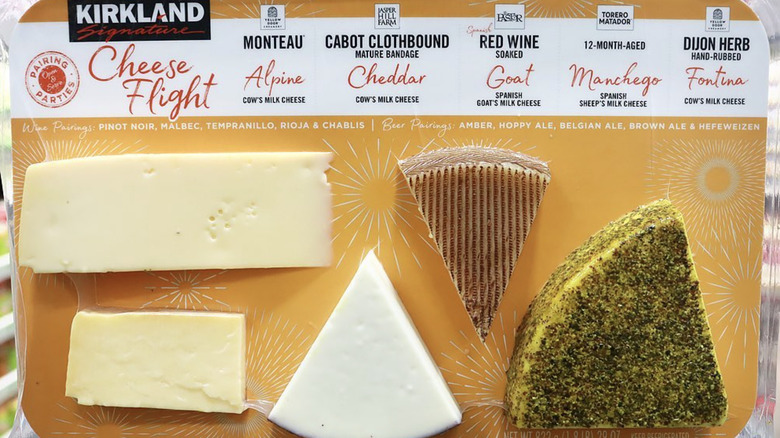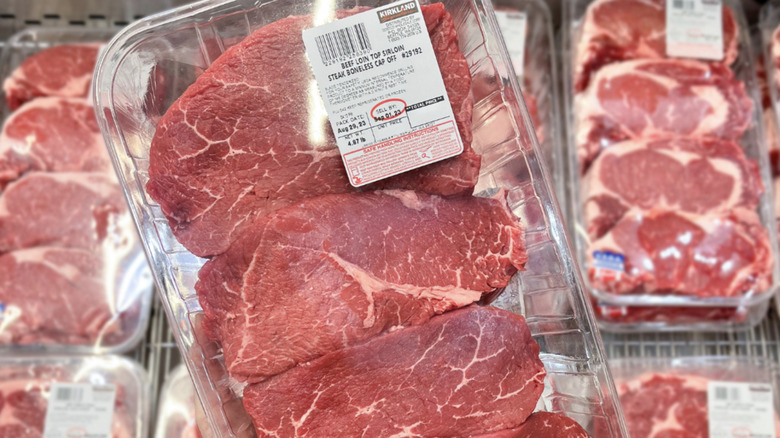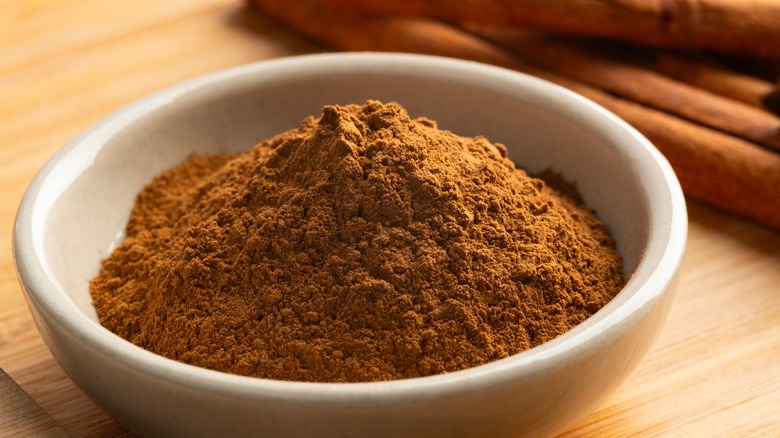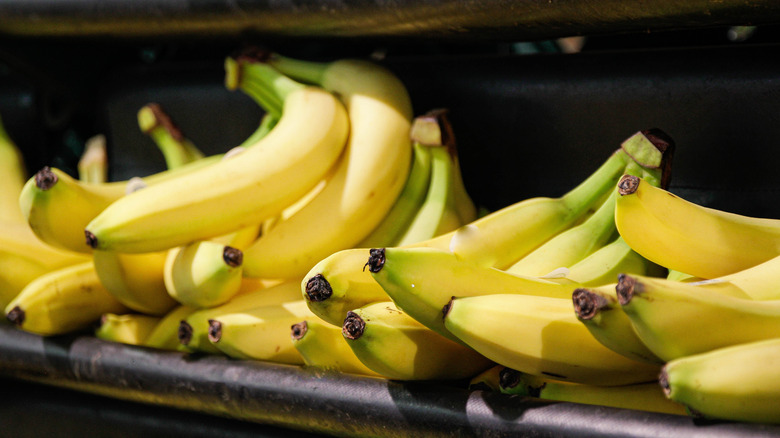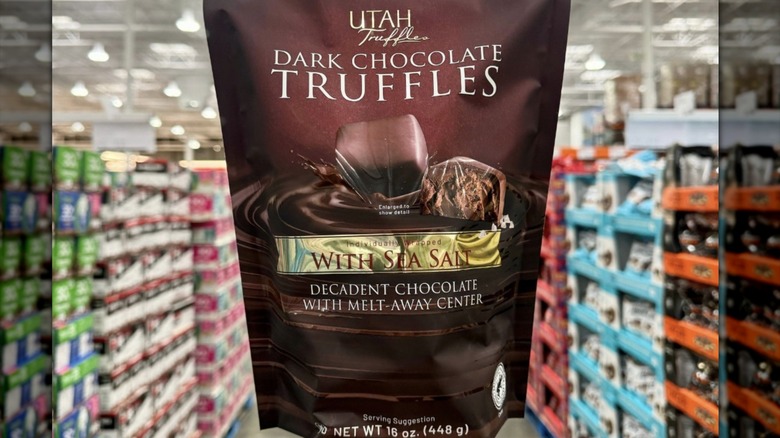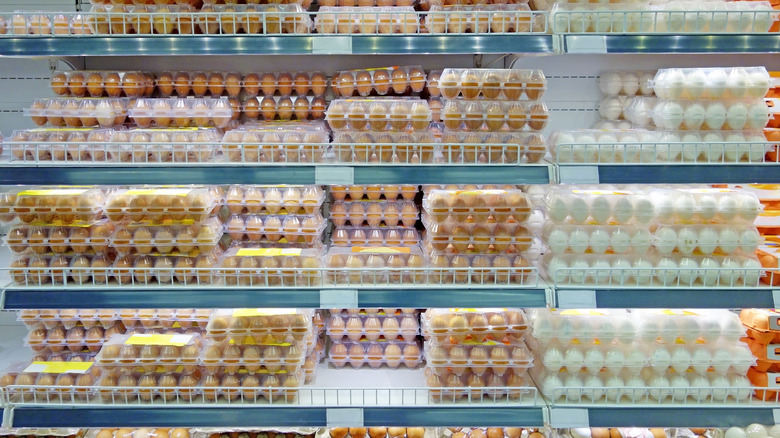11 Costco Foods That Are About To Get More Expensive
We may receive a commission on purchases made from links.
Is budget-friendly bulk food empire Costco about to get more expensive? As worries about the economy progress, many Costco shoppers are wondering if they'll still be able to afford grocery items they've been buying for years. When President Trump announced his list of reciprocal tariffs on goods imported from other nations, it left U.S. consumers in a state of uncertainty about the future of grocery shopping. We're here to shed some light on the matter.
Yes, certain items at Costco will more than likely go up in price, but tariffs are not solely to blame. Grocery prices are high already because of inflation, climate change, and rising labor costs. The inflation rate ticked up in the Post-COVID years due to worldwide supply shortages, which affected everything from car parts to Sriracha. When supply chains cannot meet consumer demand, products that become scarce increase in price. COVID-19 related supply chain disruptions are mostly behind us, but Trump's tariffs, low crop yields caused by climate change, and instabilities within the labor force are posing very real threats to food costs at the consumer level.
Before you run out to Costco and start loading up a cart like you're on "Supermarket Sweep," it's important to know a few things. Some goods initially predicted to increase in price (like food imported from Canada and Mexico) won't for now. Other necessities, like that morning cup of Joe and items from Costco's baking aisle might be worth stocking up on sooner than later.
Pure vanilla extract
When President Trump unveiled his reciprocal tariffs initiative on April 2, 2025, it became clear he was ready to go hard on the international vanilla industry. A 47% tariff was imposed upon Madagascar, the African island nation that supplies around 80% of the world's vanilla. For Costco members who enjoy baking, it was a discouraging revelation. As of May 2025, the majority of Trump's tariffs, including the one on Madagascar's exports, are on hold until July 9, 2025. This makes the temptation to stock up on Costco's pure vanilla extract all too real.
Anyone who keeps pure vanilla extract on hand knows it isn't cheap to begin with. Costco's is more affordable than most — a 16-ounce bottle sells for $9.99 in some regions, and closer to $12 in others. The label states that the pure vanilla extract was bottled in the U.S. using imported vanilla beans. Although the country of origin isn't specified, Madagascar could very well be the source. Costco also sells a 10-ounce bottle of Madagascar Bourbon Vanilla Bean Paste for just over $23.
Since vanilla extract has a years-long shelf-life (provided it's stored in a cool, dark place), this is one Costco food that could be worth investing in before tariffs take hold. For shoppers who aren't vanilla extract purists, a simple way to avoid this likely price increase is to buy imitation vanilla extract instead. Costco sells cheap, one-gallon jugs of imitation vanilla extract through its Business Center — probably enough to last a lifetime.
Coffee
If making coffee at home is part of your daily routine, Costco offers a decent selection at competitive prices — for now. The coffee trade is very much an international operation, and countries that provide coffee beans for Costco-stocked brands like Starbucks, Lavazza, and Kirkland Signature are facing reciprocal tariffs. Lavazza procures coffee beans for its Espresso Roast from nations in South America and Africa. Starbucks and Kirkland Signature House Blends are multi-origin Latin American coffees, and Starbucks is the largest importer of coffee in the U.S.
According to Live US coffee import data, the U.S. imported $8.2 billion of coffee in 2023. Those beans were primarily sourced from Brazil and Colombia. Earlier in 2025, Trump threatened Brazil with a 100% tariff due to its affiliation with BCRIS, a trade alliance that includes China, Egypt, Ethiopia, India, Indonesia, Iran, United Arab Emirates, Russia, and South Africa. Colombia's tariff rate was proposed to land between 25% and 50% if the nation didn't cooperate with Trump's mass deportation initiative. Both countries currently have a 10% tariff rate.
Tariffs are just one complication of today's coffee traders. Troubling patterns of inclement and unpredictable weather has been detrimental to crop yields for coffee growers in Brazil and elsewhere, causing an international shortage of Arabica beans. Rising expenses incurred by coffee exporters are already being passed onto consumers. The price of a coffee pod in 2024 rose to 55 cents — five cents higher than what economic analysts at Bank of America consider a key threshold value.
Seafood
Costco members can always count on their local store to supply fresh, frozen, and canned seafood in ample quantities. Fresh or frozen shrimp and packs of canned tuna are some of Costco's regularly stocked seafood items, and their affordability might be in jeopardy. The U.S. sustains a healthy domestic fish market, but much of what is sold at Costco is imported from overseas. To meet the massive consumer demand for shrimp — the seafood Americans eat most — the U.S. is dependent on hauls brought in from shrimp farms in Southeast Asia, where Trump has concentrated some of his higher tariffs.
We understand you won't be jazzed about shrimp prices going up, but you might be willing to pay more if you knew that cheap shrimp is directly connected to numerous unethical practices. Slave labor and mass deforestation are huge problems within shrimp farms in Thailand and Bangladesh. India, the top exporter of shrimp to the U.S. is also guilty of a litany of human rights and environmental abuses.
Cans of Kirkland Signature Solid White Albacore Tuna are packed in the U.S., but the fish originates from places like Fiji or Mauritius. Trump aims to hit both island nations with hefty reciprocal tariffs: Fiji's is proposed at 32% and Mauritius' is 40%. On April 9, 2025, Trump stated he would hold off on enacting the new tariffs for all nations (other than China's 145% tariff) for 90 days — a grace period during which a 10% blanket tariff would apply.
Olive oil
Costco shoppers who gravitate toward a budget-friendly jug of olive oil like a moth to a flame might want to prepare for the inconvenient truths behind its impending price increase. Costco offers a few Kirkland Signature olive oils, including 100% Italian Extra Virgin, Organic Extra Virgin, and a three-liter jug of plain Olive Oil. Unless the label says otherwise, these oils come from olives grown in several nations, most of which border the Mediterranean Sea. This region is home to the world's top olive oil-producing nations, where the heat of global warming and the sting of economic instability are undeniable.
In recent years, droughts have caused major olive oil shortages. Roman research institute Istituto di Servizi per il Mercato Agricolo Alimentare (ISMEA) reports that drought and record-breaking heat have curbed Italy's olive oil supply by 32%, threatening its position as the world's number two olive oil producer (behind Spain). A bumper harvest in 2024 helped Spain improve its production numbers and lowered consumer prices, but for U.S. shoppers, tariffs may thwart these efforts.
Strategists in Spain are hoping a tariff on the recently-lowered price of olive oil won't deviate too much from what Americans are already paying. Trump has warned that certain Spanish imports could come with a 25% tariff because Spain imports crude oil from Venezuela. In Turkey, low crop yield is no longer the problem, sharp increases in fertilizer, energy, and labor costs are. Whether Turkey's tariff will rise beyond the current 10% is undetermined.
Seasonings with garlic
If you've never pondered the origins of the garlic inside dried seasoning you bought at Costco, you're not alone. The truth is, a lot of dried garlic we eat in spice blends, marinades, and sauces is imported from China. In President Trump's quest to bring the manufacturing industry home, he's rallied hard against China, announcing a reciprocal tariff of 125% on most Chinese goods plus an additional 20% Fentanyl tariff. Companies using Chinese-imported garlic in their seasonings may pass some of the additional expense to consumers, but raising tariffs on Chinese garlic aren't new.
When Trump raised tariffs from 10% to 25% on $200 billion worth of Chinese imports in May 2019, garlic growers in California were thrilled — they'd been lobbying for anti-dumping tariffs on Chinese garlic since the 1990s. "Dumping" is the practice of flooding the market with imported products sold at far lower cost than the domestic version to eliminate competition. Costco's granulated, minced, and peeled garlic comes from California already, so tariffs won't impact current prices. The same may not be true for garlicky seasonings sold by spice giant McCormick & Company.
McCormick uses Chinese garlic in hundreds of its seasonings, which likely includes the garlic salt it sells at Costco under the Lawry's label. Back in 2019, McCormick CEO Lawrence Kurzius told Reuters the company had no intention of swapping Chinese-grown garlic for American because it didn't suit the existing recipes. "They're not substitutable ... Just like wine, origin matters and terroir matter."
Imported cheese
In some instances, moving food production stateside could be a step in the right direction when it comes to ending fundamentally harmful manufacturing practices like climate destruction (which contributes to global warming) and human rights abuses. Then there's imported cheese. When cheese enters the conversation, venerable cheeses from all over the world become of interest, but if they get too expensive because of tariffs and/or global warming, centuries-old traditions can become obsolete.
Gouda, a traditional yellow cheese from the Netherlands, is one of Europe's oldest cheeses, originating in the 12th century. Authentic Gouda must be made in Gouda, a town in South Holland. Gouda has a low sea level and climate change is causing it to rise, exacerbating the frequency and severity of floods in the region. These conditions make dairy farming so difficult, experts have predicted that within 100 years, Gouda production will be impossible. Costco has been known to sell Gouda cheese products and European cheese assortments featuring other vulnerable imports like Dijon, and the chances of items getting more expensive is high.
Domestically-produced versions of popular imported cheeses are out there, like Italian-style burrata, which is sold by Costco and places like Amazon too. Many of these options are solid and won't be subject to tariffs, but sometimes you just want the original. Costco also sells full wheels of imported cheese. Prices for those are already high, and they may get even pricier in the near future.
Beef
We've talked a lot about tariffs because well, they're kind of confusing and a little scary, but one Costco staple that's about to go up in price is beef, and tariffs aren't the core issue here. According to the online farm journal Drovers, cattle prices at the close of 2024 were at a record high due to domestic cattle numbers being at a 64-year low. The demand for beef in the U.S. remains high, and with less American-bred cattle at the ready, commercial costs could continue to soar.
The dwindling U.S. cattle population has allowed the South Asian beef market to thrive in the states. Sales for Asian beef were up between 5% and 6% in 2024. The influx of imported beef offset the potential for sticker shock as the cost of American beef rose — but with tariffs in the mix, earnings could slow down this year. If Asian beef importers decide to transfer price hikes onto consumers, it could draw attention to how expensive domestically-sourced beef has gotten.
As for why the U.S. is raising less cattle, those reasons are cost-related too, and it all goes back to global warming. The ramifications of climate change are felt everywhere, including the American farmland where cow feed like corn and soy are grown. As it becomes more expensive to feed large herds of cattle, suppliers may be forced to downsize.
Cinnamon
A big, economical container of cinnamon is a tempting Costco grab, but consumers could soon see a change in how it's priced. Due to its multifaceted nature, cinnamon demand in the U.S. is high. According to data compiled by the Observatory of Economic Complexity (OEC), the U.S. imports more cinnamon than any other nation, accounting for 18.1% of its global imports between February 2024 and January 2025. However, exporters in major cinnamon-producing countries like Sri Lanka have grappled with supply chain disruptions due to weather-related challenges, labor shortages, and political unrest.
Trump's reciprocal tariff on Sri-Lankan goods is set to increase from 10% to 44% on July 9, 2025. America's top supplier of cinnamon is Indonesia, which exported $8.07 million of cinnamon to the U.S. in January 2025 alone. Indonesia's reciprocal tariff is expected to increase from 10% to 32% that same day. These added costs are likely to worsen the hardships the cinnamon trade has faced for years.
Substantial rises in cinnamon costs were underway at the start of 2020. Farmers citing a lack of raw materials and rainy seasons called for price increases while struggling to keep up with steadily growing consumer demand. Projected price increases are expected in 2025 and may affect more than just ground cinnamon. Bakery items, supplements, and other goods containing cinnamon might also become costlier to consumers if they become significantly more expensive for food manufacturers to produce.
Bananas
Even when the economy is hurting, a bunch of bananas have been pretty cheap. Those days might be a thing of the past at Costco and other grocery stores. Growing bananas requires a tropical environment, but that hasn't stopped Americans from keeping bananas on their permanent shopping lists — in fact, they're the most-purchased fruit in the U.S. Costco's bananas are grown in Costa Rica, Honduras, Guatemala, Colombia, Ecuador, and Peru. As Trump's tariffs loom, these banana-producing nations in Central and South America may need to raise prices to maintain business as usual.
The Banana Association of North America (BANA) stated that the 10% reciprocal tariff currently imposed on banana imports could raise the cost of bananas in the U.S. by $250 million a year. This could cause a drop in demand, creating huge losses within the banana market. Tom Stenzel, BANA's executive director, told Fresh Fruit Portal that imposing a tariff on bananas doesn't align with Trump's aggressive trade agenda. "It really doesn't make sense for these countries to be included ... the real goal is not to have tariffs on bananas or any tropical fruit item that you can't grow in the U.S."
Banana prices haven't noticeably risen yet, but BANA is preparing for the worst. The organization has contacted members of Trump's administration regarding tariff concerns. BANA also pointed to travel delays on the Panama Canal and a tendency for ships carrying bananas to be rerouted as additional sources of financial burden in the industry.
Chocolate
For over a decade, the chocolate industry has encountered serious supply challenges, and as Costco shoppers may have noticed, mounting costs. Unpredictability in rain patterns, rising temperatures, and drought have resulted in increasingly low crop yields for West African cocoa farmers, especially in Côte d'Ivoire and Ghana, where more than half the world's cocoa is produced. Meanwhile, increased demand for cocoa in China and India have driven up costs and further strained supply.
Import tariffs threaten to compound these difficulties, while changes in European Union (EU) policy stand to shake up operations like never before. In December 2025, the EU will implement new deforestation-free requirements on major cocoa suppliers in response to mounting climate change fears. Suppliers will need to provide GPS-supported data confirming that every exported cocoa bean was sustainably grown. Suppliers that lack the technological or financial resources to execute this practice up to the EU's standard could drop cocoa's supply numbers even lower.
The harder chocolate is to come by, the more expensive it will be. As much as fans of Costco's chocolate don't want prices to go up, these changes in trade regulation are renewing focus on systemic flaws in cocoa farming. Child labor and farmers earning impoverished wages (Redstone Foods estimates most earn less than one dollar per day) are inhumane practices that have persisted in the West African cocoa trade for too long. The changes this embattled industry needs run deep, and putting them into action will be an uphill climb.
Eggs
Unless you've been totally off the grid, you're probably all too aware of how expensive eggs are at Costco and everywhere else. Bird flu continues to tear its way through commercial farms all across America. As of May 1, 2025, the U.S. Centers for Disease Control and Prevention (CDC) has logged 169,325,151 cases of highly pathogenic avian influenza (HPAI) A(H5) viruses in wild and domestically kept bird populations. Public health risk of bird flu in humans remains low, but the supply chain disruption the virus has caused is nothing short of dramatic.
With nowhere else to turn, the United States Department of Agriculture (USDA) is looking to import more eggs as a way to replenish widespread shortages at the consumer level. Turkey, a leader in international egg exports, is rising to the occasion, announcing it will ship 15,000 tons of eggs to the U.S. by July 2025. These efforts are a step in the right direction in regard to supply and demand, but it might not bring down egg prices long-term. Imports from Turkey are currently at 10% — the blanket percentage Trump granted to all nations (apart from China) until July 9, 2025. The president has not confirmed Turkey's reciprocal tariff rate beyond this time frame.
